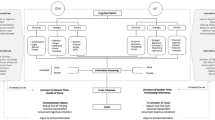Abstract
This article outlines three major assumptions often implicitly made in dual-task experiments conducted to assess attentional capacity requirements of memorial processes. These assumptions are shown to be incorrect. Three criteria which should be met in dual-task experiments that draw inferences from secondary task decrements are proposed: (1) there should be resource trade-off with the secondary task sensitive to the resource demands of the primary task; (2) there should be equivalence of single and dual primary task performance; and (3) the secondary task must remain resource sensitive throughout the experiment. An experiment was carried out in which the primary and secondary tasks were designed according to these criteria. The results demonstrate that when the criteria are met then secondary task performance can be predictive of primary task difficulty: however, the experiment also highlights the fact that a simple assessment of capacity will not predict total task performance.
Similar content being viewed by others
References
Baddeley, A. (1978). The trouble with levels: A reexamination of Craik and Lockhart’s framework for memory research.Psychological Review, 85, 139–152.
Battig, W., & Montague, W. (1969). Category names for verbal items in 56 categories: A replication and extension of the Connecticut category norms.Journal of Experimental Psychology Monographs, 80 (3, part 2).
Britton, B.K., Meyer, B.J.F., Simpson, R., Holdredge, T.S., & Curry, C. (1979). Effects of organization of text on memory: Tests of two implications of a selective attention hypothesis.Journal of Experimental Psychology: Learning, Memory, and Cognition, 5, 496–506.
Craig, A. (81979). Nonparametric measures of sensory efficiency for sustained monitoring tasks.Human Factors, 21, 647–653.
Craik, F.I.M., & Lockhart, R. (1972). Levels of processing: A framework for memory research.Journal of Verbal Learning and Verbal Behavior, 11, 671–684.
Craik, F.I.M., & Watkins, M.J. (1973). The role of rehearsal in short-term memory.Journal of Verbal Learning and Verbal Behavior, 12, 599–607.
Crowder, R.G. (1967). Short-term memory for words with a perceptual-motor interpolated activity.Journal of Verbal Learning and Verbal Behavior, 6, 753–763.
Eberts, R., & Schneider, W. (1986). Effects of perceptual training of sequenced line movements.Perception and Psychophysics, 39, 236–247.
Fisk, A.D., & Schneider, W. (1983). Category and word search: Generalizing search principles to complex processing.Journal of Experimental Psychology: Learning, Memory, and Cognition, 9, 177–195.
Fisk, A.D., & Skedsvold, P. (1986).Examination of higher order task consistencies: Automatization of relational information. Manuscript in preparation. Columbia, SC: University of South Carolina, Department of Psychology.
Gopher, D., Brickner, M., & Navon, D. (1982). Different difficulty manipulations react differently with task emphasis: Evidence for multiple resources.Journal of Experimental Psychology: Human Perception and Performance, 8, 146–157.
Kahneman, D. (1973).Attention and effort. Englewood Cliffs, N.J.: Prentice-Hall.
Keppel, G. (1973).Design and analysis: A researcher’s handbook. Englewood Cliffs, N.J.: Prentice-Hall.
Logan, G.D. (1979). On the use of concurrent memory load to measure attention and automaticity.Journal of Experimental Psychology: Human Perception and Performance, 5, 189–207.
Logan, G.D. (1980). Short-term memory demands of reaction-time tasks that differ in complexity.Journal of Experimental Psychology: Human Perception and Performance, 6, 375–389.
Moray, N. (1979).Mental workload: Its theory and measurement. New York: Plenum Press.
Nelson, T.O. (1977). Repetition and depth of processing.Journal of Verbal Learning and Verbal Behavior, 16, 151–171.
Norman, D.A. (1964). A comparison of data obtained with different false-alarm rates.Psychological Review, 71, 243–246.
Navon, D. (1984). Resources—A theoretical soup stone?Psychological Review, 91, 216–234.
Ogden, W.C., Martin, D.W., & Paap, K.R. (1980) Processing demands of encoding: What does secondary task performance reflect?Journal of Experimental Psychology: Human Perception and Performance, 6, 355–367.
Paap, K.R., & Ogden, W.C. (1981). Letter encoding is an obligatory by capacity-demanding operation.Journal of Experimental Psychology: Human Perception and Performance, 7, 518–528.
Pew, R.W. (1979). Secondary tasks and workload measures. In N. Moray (Edd.),Mental workload: Its theory and measurement. New York: Plenum Press.
Posner, M.I. (1978).Chronometric explorations of mind. Hillsdale, NJ: Erlbaum.
Posner, M.I. (1982). Cumulative development of attentional theory.American Psychologist, 37, 168–179.
Posner, M.I., & Boies., S.J. (1971). Components of attention.Psychological Review, 78, 391–408.
Schneider, W., & Fisk, A.D. (1982a). Degreee of consistent training: Improvements in search performance and automatic process development.Perception and Psychophysics, 31, 160–168.
Schneider, W., & Fisk, A.D. (1982b). Concurrent automatic and controlled visual search: Can processing occur without resource cost?Journal of Experimental Psychology: Learning, Memory, and Cognition, 8, 261–278.
Schneider, W., & Fisk A.D. (1984). Automatic category search and its transfer.Journal of Experimental Psychology: Learning, Memory, and Cognition, 10, 1–15.
Schneider, W., & Shiffrin, R.M. (1977). Controlled and automatic human information processing: 1. Detection. search, and attention.Psychological Review, 84, 1–66.
Tsang, P. (1983).The structural constraints and the strategic control of attention allocation. Unpub. Ph.D. Diss. University of Illinois, Champaign.
Tyler, S., Hertal, P., McCalum, M., & Ellis, H. (1979). Cognitive effort and memory.Journal of Experimental Psychology: Learning, Memory, and Cognition, 5, 607–617.
Wickens, C.D. (1980). The structure of attentional resources. In R. Nickerson and R. Pews (Eds.),Attention and performance VIII. Hillsdale, NJ: Lawrence Erlbaum.
Wickens, C.D. (1984). Processing resources in attention. In R. Parasuraman and D.R. Davies (Eds.),Varieties of attention. New York: Academic Press.
Wickens, C.D., Sandry, D.L., & Vidulich, M. (1983). Compatibility and resource competition between modalities of input, central processing, and output.Human Factors, 25, 227–248.
Wickens, C.D., & Yeh, Y.Y. (1986). POCs and performance decrements: A reply to Kantowitz and Weldon.Human Factors, 27, 549–554.
Williges, R.C., & Wierwille, W.W. (1979). Behavioral measures of aircrew mental workload.Human Factors, 24, 549–574.
Author information
Authors and Affiliations
Rights and permissions
About this article
Cite this article
Fisk, A.D., Derrick, W.L. & Schneider, W. A methodological assessment and evaluation of dual-task paradigms. Current Psychology 5, 315–327 (1986). https://doi.org/10.1007/BF02686599
Accepted:
Published:
Issue Date:
DOI: https://doi.org/10.1007/BF02686599




